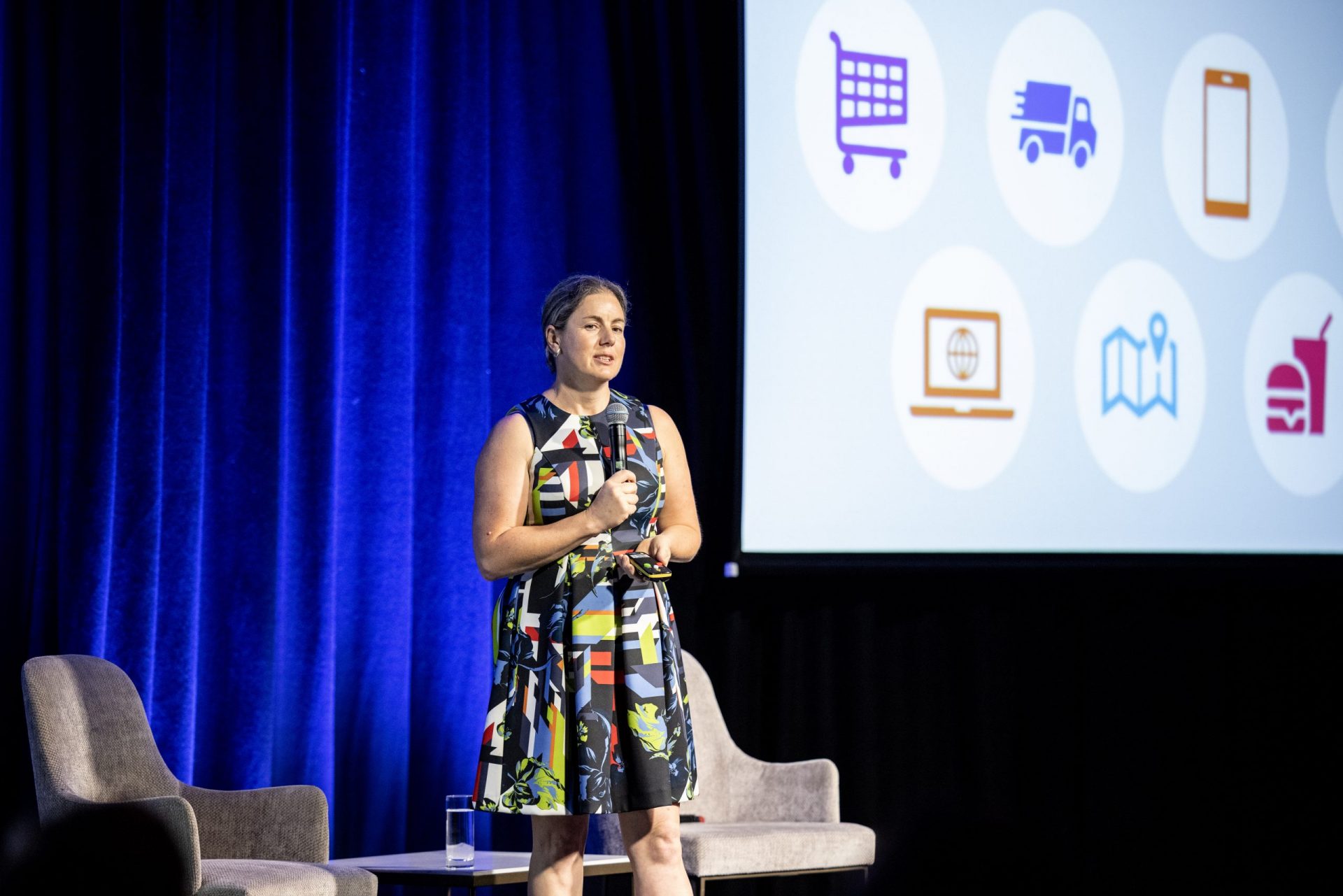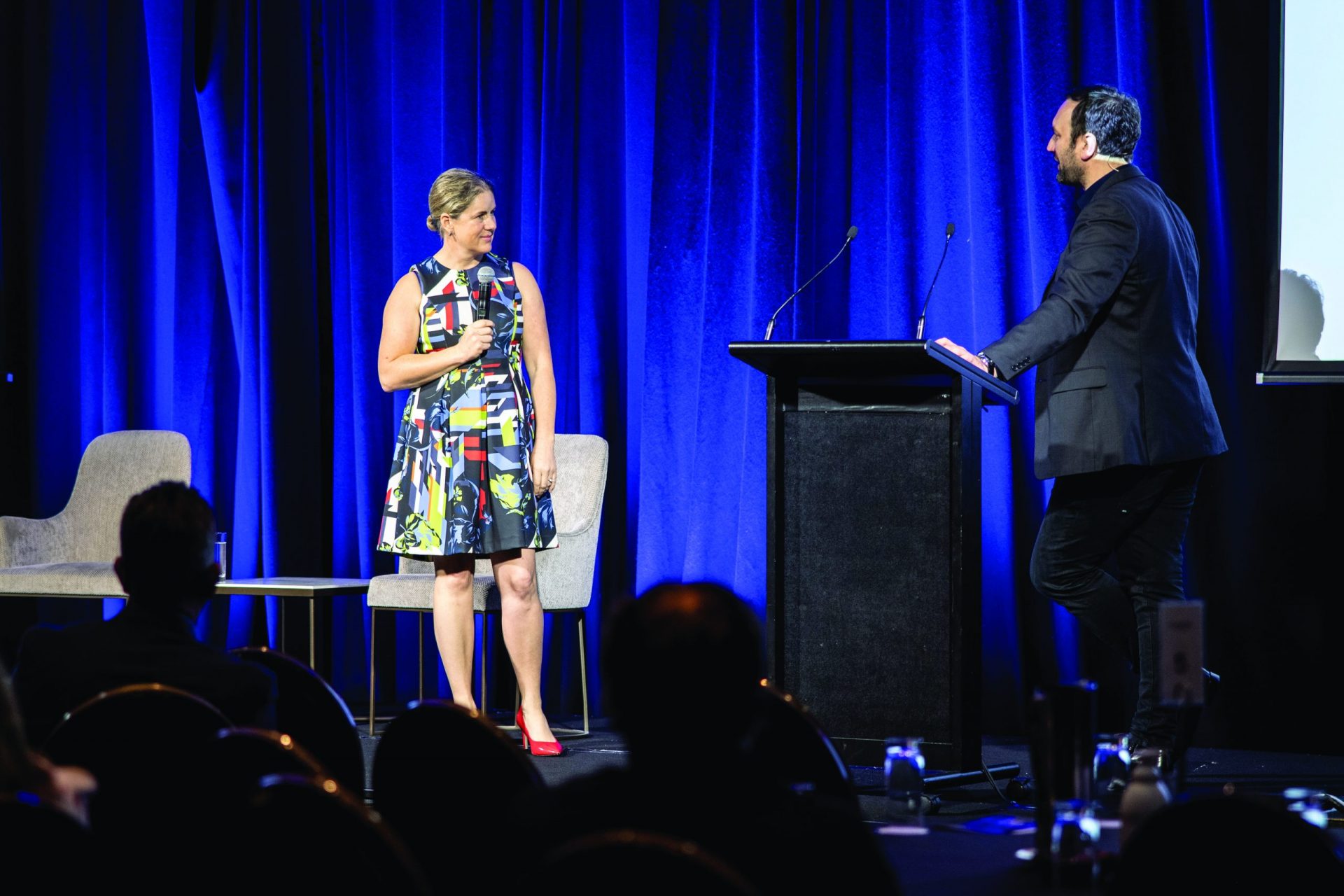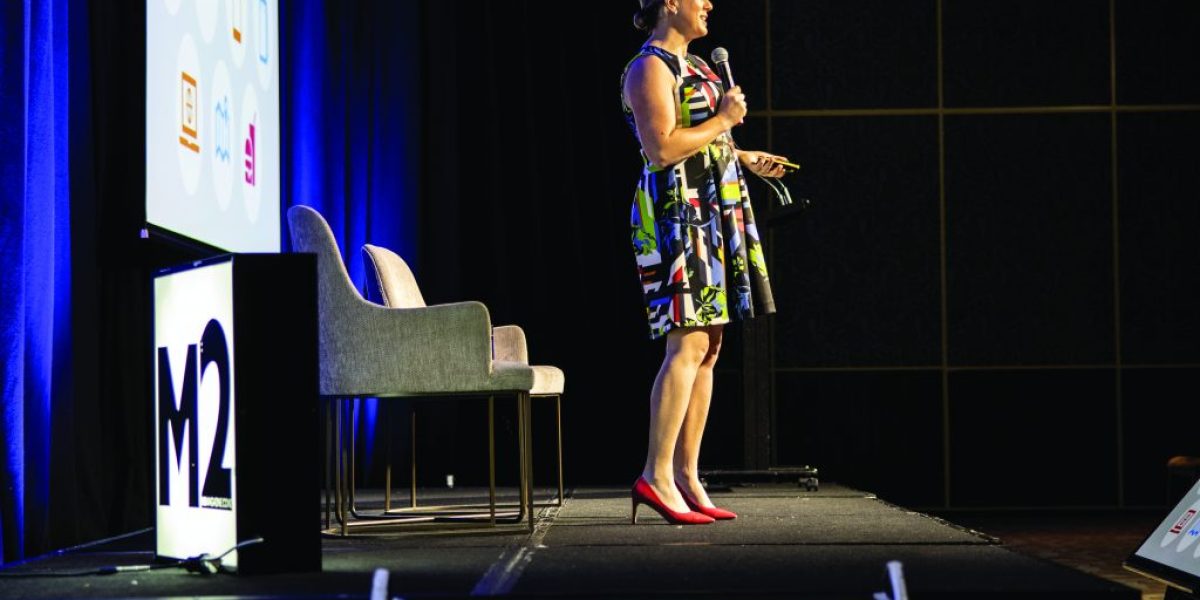How To Monetise Your Own Data
This year has been a great example of the sort of shifts that markets can go through; changes and buy habits, sentiments and so on. Market research is just one of those vital partnerships to any relevant business, but it’s always seemed a little bit old school until Yabble came along with an agile, smart and cost-effective platform to connect customers with brands and to allow for more engaged insights.
The following is a transcript from a talk Rachel O’Shea, COO & Co-Founder of Yabble, gave at the M2 Summit held on 2 November 2020.
We’re a market research business and we’ve had a whole lot of change this last year. I don’t know about you, but in my house, we’ve gone back to having dinner at the table, we have more time together, we’ve changed the things that we do at home. Everyone’s doing something differently and I wanted to talk to you about how consumers are changing their views of data and why we as businesses should all start to be consumer data champions.
You all know the value of data to business. Your businesses are all working really hard to mine data to get extra value and to drive improvements in what you do. An Accenture report recently put the value of data at likely to be $3 trillion by 2030. That could be right, that could be wrong, it could be triple that. But data gives us a lot of opportunities. The big five are 10% of the US market cap plus or minus, but they only employ 0.5% of the employees.
If you go back 20 years, when you had General Electric, you had the petrol companies, you had others, the stretch between valuation and employee numbers was a lot different. People are using data, and not people, to drive great insight.
Netflix talks about using data in such a way that they actually create 33 million individual versions of Netflix. The customisation, the algorithms that they use to serve you, things you might like to watch are all driven by data and data scientists.

Gone are the days of marketeers and teachers and lawyers coming out of university. One of the great stats in the US recently was about who is being most employed, what are the jobs that people are looking for when they’re thinking about career choices? A data scientist was the leading job from 2015 to 2019 in one of the big HR studies there. That was based on how much they earn when they start working, job satisfaction and love and the value that they add to organisations.
All of that has been really progressive. There’s so much happening in the world of business data, the mining of data. If I fast forward 10 years in businesses, the data scientists will have done a brilliant job. They will have mined all of that data as hard as they can. They will have optimised algorithms to service the right products, the right services. Our onboarding experiences will be amazing.
Then what are they going to do? You will get to a point of diminishing returns when you only look at your own customer data. There’s only so much you can learn from your own customers. What happens when you want to do customer acquisition? When you need to go and find some from the market. You need the same level of data from people you don’t have that data from.
So how are you going to get it?
That’s where you start to think about how we can change the data paradigm to get consumers to work with us, to share data. At the moment, when I talk to consumers, and I do this all the time, we talk about how do you feel about data sharing? How do you feel about data privacy? The Privacy Act changed in New Zealand in December. It’s only a very small distance compared to some of the other global standards.
88 percent of New Zealanders talk about their data being shared with a third party, without their permission. It’s concerning. 80 percent of New Zealand consumers say businesses make it hard to opt out of receiving information or their data being shared. They talk about a lack of transparency and a lack of control.
I can go and buy pieces of data that you don’t even know about, it’s not even on your consciousness. If I want to buy banking data, I can go and buy it. I don’t get your PII (personally identifiable information), but I could go and say, ‘I’d like to buy some data about men in New Zealand aged between 30 and 50 who live in Auckland,’ and I can go and buy a chunk of their banking data. It’s about $15 a pop. That makes people furious, that data can be bought and sold without them knowing about it.
What’s happening is that governments are legislating in favour of consumer rights when it comes to data. You’ll all be familiar with GDPR. The Californian Consumer Privacy Act goes a step further when it comes to consumer rights. It’s just a little thing I wanted to share with you because I think if you start to think about how we can change the paradigm and be better data holders and recognise co-creation, then some of those legislations are a really good reminder for us.
Under this legislation, what is PII? It’s suddenly a lot broader than your name, your address, your mobile phone number. It’s actually your biometrics. It’s the geo location data that comes from your mobile phone. It’s your search data. It’s a product that you purchased when you scanned a loyalty card and that was tracked as a purchase that you made. That’s an actual piece of personal information. That’s quite a long way forward from where we are in New Zealand today.
It also requires consumers to be able to see all the information a company holds on them. So if I wanted, I could go to a supermarket and ask, ‘What did I buy in the last 12 months? I want to change my shopping habits. My income has changed after Covid. Give me my data so I can analyse my own purchasing behaviour and maybe make some changes.’ If you’re an organisation, how hard is that for you to do right now? It’s probably really, really difficult. But think about it, if you built a system over time that let people do that with you and you provided them with analytics and you help them to understand what they were doing, you could serve them up better suggestions or help them use their data in a way that was useful to them and to you.
Businesses must allow consumers the choice on whether to share their data with third parties. Can I sell your data without your knowledge? No, people must be aware. Back to that banking example, that can’t happen under this sort of legislation. Imagine this; businesses must provide a full list of all of the third parties data has been shared with. Who did you sell it to? Suddenly there’s a whole lot of other information you’ve got to provide.
The reason I’m sharing boring legislation with you is that it’s showing where in the world consumer data and data trading and data ownership is going. But you take that and you overlay it with how consumers are feeling right now and the sentiments that we’re seeing coming out of Covid. We learnt that consumers are really keen to support and use products that are New Zealand grown. They are keen to reduce, reuse and recycle. We saw that 54 percent of them talk about making an active move to conscious consumption, and changing what they purchase based on the brand.
You might’ve seen CoGo recently was in the news. That’s an app that allows you to look at where you’ve made your purchases and look at the environmental and sustainable credentials of that business. Then you can make a vote with your wallet because there’s another shop just down the road that actually compares more favourably.
We are becoming more aware of the choices that we make. As a business today, we can go, ‘We don’t have to do this. This legislation doesn’t make us.’ But what if we said, ‘Hey consumers, we want to work with you on data. We want you to be co-creators and we want to recognise you as a person involved in this transaction.’ Because right now it’s the data holders that use the data, the data holders that commercialise data. It’s not the consumers who get the benefit of the data they help to create. I’m really passionate about seeing how we can change that paradigm, because if we don’t, there’s a real risk that we lose brand trust.
Facebook gets beaten up all the time and fair play, they don’t always get it right. The day after Cambridge Analytica broke in 2018, Facebook’s share price went down $36 billion, it dropped 7 percent. Pre-Cambridge Analytica, Facebook was a brand that had 80 percent trust from consumers and afterwards it had 29 percent. Fast forward a year, 44 percent of the 18-29 year old segment in America deleted the Facebook app. That’s a massive growth segment, a really valuable consumer set, and they walked away.
That generation is some of the most ethical, the most values-driven generation. They’re all valuable shoppers that we need to think about. Facebook got it wrong. If we fast forward to recently, when all of the big tech companies were giving stock market updates, of the big five, Mark Zuckerberg was by far the most pessimistic about the business outcomes for Facebook in the next 12 months. They’ve lost a lot of trust and trust is really hard to get back. You make one mistake, a significant mistake, and you can really be lost. We think about consumer data, we think about if we openly share with consumers their data, we openly recognise it and actually most importantly, we openly reward them for it, then we’re in a collaboration situation, we’re in a co-creation situation. And that’s a far more positive conversation to have with your consumers about data.
We really want to change that paradigm. It’s been happening for a long time with the gig economy. Consumers now gig their driveways with Payable. They gig this spare rooms with Airbnb. They can gig them money with things like Harmony. And part of the reason we are so excited is with our business Yabble, we want to help them gig their data as well.
We recognise consumers as co-creators of their data. We let them join that data up and bring it in together, so we can get, in the research world, a far richer view of people. I might shop at Mitre10, at Vodafone, at New World. Each of those brands has a view of me as a customer from the data that I give them. But, if we joined all those pieces of data together, you’d know a lot more about me. You’d know more about my preferences, maybe the level of brands that I like to buy within those different categories, you know more about my spend, you know what I’m likely to react to when it comes to advertising. The more connected we make our data, the better the insights we can generate. And that’s what we’re doing.
We did a lot of stuff during Covid. We worked very closely with Foodstuffs. Everybody ran out of toilet paper, had bought far too much dried pasta and shopped a bit differently. We saw that 32 percent of New Zealanders now write shopping lists, they never used to. 170,000 New Zealanders shopped online for the first time during Covid. A lot of them were in that 50 plus age group, so suddenly the Baby Boomers know how to shop online, that’s lethal. They’ve got money. We’ve got this group of people who can now shop differently.
We all suddenly worked out what QR codes were for. As advertisers and marketers, we stuck them on posters 15 years ago, hoping people would scan them to look at another ad, it didn’t happen. But now we know the power, the ease, of how these can be used.
We recently ran a project for a brewery in Australia, and they wanted to know more about how effective their advertising was on social media. The 18-24 year olds are not drinking beer anymore. They’re all drinking spritzers and seltzers and sodas. The brewery put QR codes on a couple of new launches. They wanted to be far more agile in their feedback, so people who bought the beer, scanned the code and answered one set of questions on flavour and taste and they got a voucher to buy more beer. In the next production run, they looked at how they could optimise the flavour of that beer. Super, super quick. The marketeers could look at who was buying it, what was motivating them and tweak their social advertising really, really quick. The way we’re collecting insights and using data is really starting to change.
In summing up, consumers are co-creators of data. We do stuff every day. Earlier today, I talked to Siri to get a phone number, I booked some appointments, I used ParkMate to park my car in the car park. I created a lot of data.
Be a consumer champion. Think about it in your organisation; how you can be more transparent, how you can work with your consumers on data. Because ultimately you can commercialise it together and you can build their trust and reputation, and they’ll be loyal with you because they can trust you with their data. They know how it’s being used, and it adds a lot of value.

Q&A
You’re talking about the insights that you’ve been able to get this year and that shift in our awareness of how our data’s been used. But are the big social media companies really going to let that go? Are they going to allow this paradigm shift to come through and let us use our own data?
There’s businesses who’ve been built on owning data. Facebook can say no, because that’s probably how their business model started, it’s how they make their money today. But that’s one example.
I think there’s a lot of other businesses out there, charities out there, companies out there, where it might change their revenue model, but what they get instead is, still some revenue, but they get more connectivity with their customers. You get more collaboration, you get more trust, and those are all intangible values that, in the long-term, can add a lot of value to what you do.
It’s not all about the dollar when it comes to consumer data. I think you’ve got to recognise how it works and if you don’t, legislation will push you there. Don’t get pushed there. Being pushed there by legislation is really negative behaviour. Consumers, and particularly the younger ones, they want companies, they want people, who are transparent and honest. These are values that we’re seeing in all of our data that are growing exponentially. Be in the forefront of it. Don’t wait to get pushed there.
You’ve created this paradigm shifting company out of New Zealand. You’ve gone global with it, you’ve raised capital. Was there any hurdle being in New Zealand?
No, I didn’t see any hurdle in being in New Zealand. Part of that had to do with the fantastic lead investor that we had. Rob Vickery and Hillfarrance Capital came out of the US and they had a much broader remit and a much wider view of the world.
Brand New Zealand is on a real up right now. If you look at how we’re viewed internationally, for the way we’ve dealt with Covid, for the attitudes and the innovative spirit that we have, I think as a Kiwi company right now, it’s an advantage. We really need to leverage it. We’re doing some really smart, really good stuff. We’re getting some great talent back into New Zealand. People are coming home. Brilliant, smart Kiwis are helping to add to our businesses. Now’s a great time to get out there and disrupt.
Is there any low hanging fruit that businesses should be thinking about that are right there to grow market share, to grow the business?
One of the things that we’re seeing a lot of is this real dichotomy. We’re going into a recession, right? There’s a hard economic reality right now. 84,000 New Zealanders are on mortgage deferrals, it’s about 9 percent. There’s a whole lot of delayed effect coming.
We’ve got the people who have got disposable income and have more of it, their jobs are secure, they’re traveling less, their debt is low, their asset base is high; those are an opportunity. If that’s your target segment, now’s a great time to go and acquire those people.
For those whose disposable incomes are dropping, they’re changing their behaviour and how they shop. 12 percent of people have changed the supermarket they usually shop at and have moved to a cheaper one in the last six months. Things are changing.
It really depends on who you’re trying to talk to, but I do think there are opportunities out there. Even those who are spending less, they’re still spending. So it’s about, how do you add value to those people? How do you help them prepare for 12 months in the future? How do you give them value for staying with you? You’ve got to think about who’s in the position they are when it comes to the disposable dollar.

